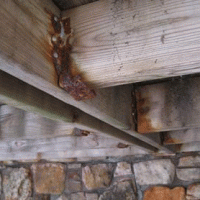It is fairly common knowledge that the use of dissimilar metals in plumbing systems can quickly result in a leak due to a corroded pipe or fitting.
The mechanism causing the problem is galvanic corrosion. The pairing of metals with different electromotive potentials, in the presence of water or another electrolyte will create a battery. A miniscule current flow is established, causing unintended consequences. The flow of electrons from the more reactive metal, or anode, to the less reactive metal, or cathode, results in loss of structural integrity of the former.
Less commonly known is that the same phenomena can occur between the fasteners/hardware and chemicals used in pressure treated wood. If you have built a deck in the last 10 years and noticed that the screws and hangers corroded much quicker than you have seen before, you used the wrong screws and hangers. The ACQ chemicals used for treating wood since about 2004 is much more corrosive than the prior CCA treatment, no longer used due to environmental concerns.
The fasteners used with the newer pressure treated wood must be more corrosion resistant, or risk structural failures. If you used galvanized screws with a bright finish, be aware of the probability of early failure. It is better to use hot-dipped galvanized screws and bolts, with dull, rough finish. Or, you could use vinyl-coated fasteners. Better yet, use stainless steel fasteners and hardware, if you can afford the substantially higher cost. Of course, the higher cost will be worth it if you have an elevated deck or a boat lift for your pride and joy runabout. Just don’t mix different types of screws and hardware, say galvanized and stainless steel in the same structure, or your situation may become worse.
If you use the same type fasteners/hardware in your newer pressure treated lumber structure as you used in the old CCA treated structure, you can expect corrosion failure to occur 2-3 times faster. Checking the fasteners in your newer structure is a prudent thing to do.
Warren’s forensic engineering and consulting firm, founded in 1997, provides technical investigations and analysis of personal injury and property claims as well as expert testimony for insurance adjusters and attorneys. Extremely well versed in the disciplines of mechanical, electrical, chemical, structural, accident reconstruction and fire and explosion investigation, our engineers and consultants are known for delivering the truth — origin, cause, responsibility and cost of an event or claim — with unmistakable clarity.




